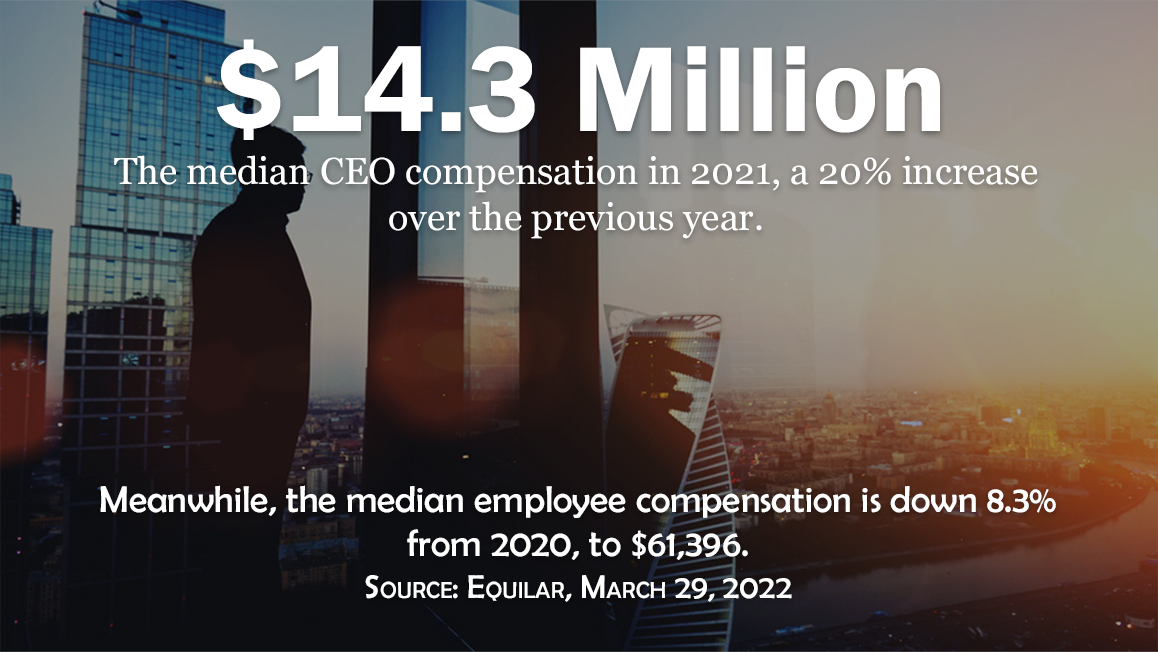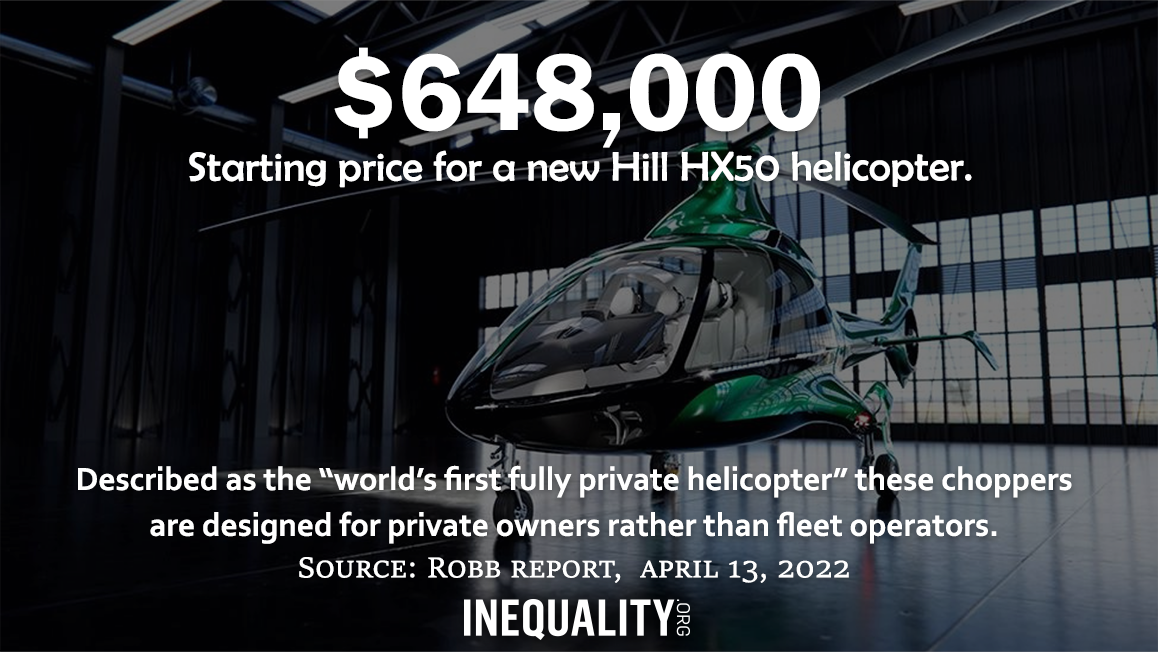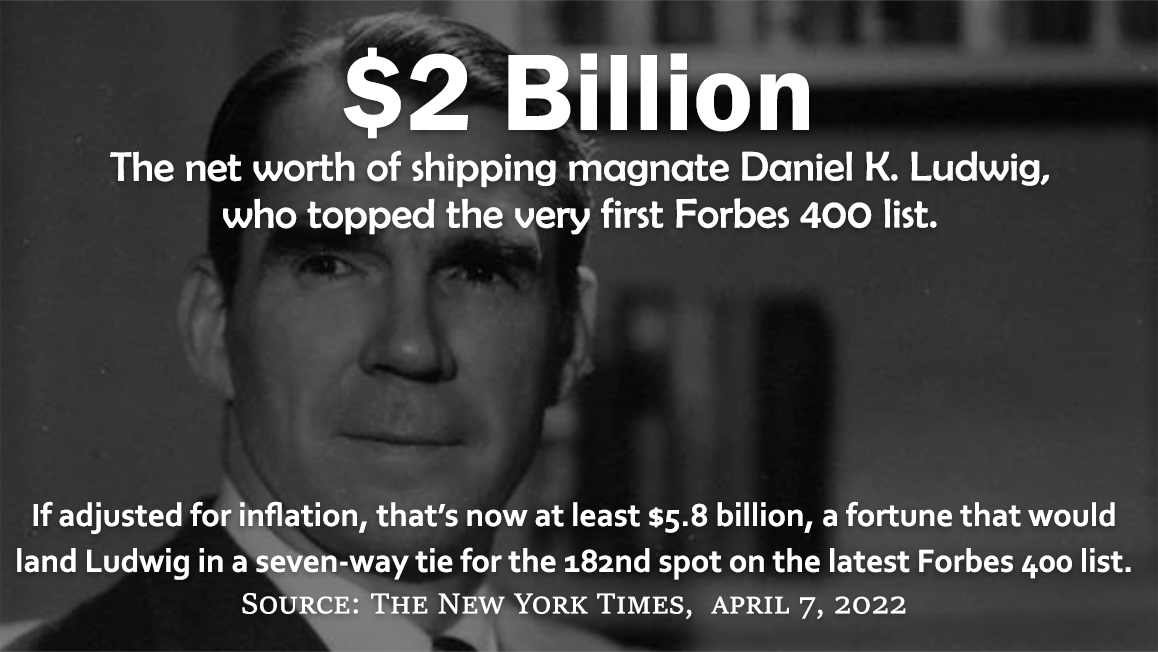| THIS WEEK |
Depending on when you read this, the richest person in the world — Tesla CEO Elon Musk — may already own the popular and influential global social media platform Twitter. Musk has put together a $46.5 billion financing package to buy out Twitter. No single individual has ever advanced a larger corporate-takeover financing package.
So what does this all mean? Exactly how a potential Musk ownership will impact our everyday experience on an app with over 217 million daily users remains, of course, to be seen. But we can recognize one certainty: We need to keep a close eye on the new ways Musk and the rest of our wealthiest wield their fortunes for social and political influence.
“When billionaires talk about freedom, watch your wallets,” Robert Reich recently warned. “Behind Elon Musk’s blather about free markets, free speech, and free choice is his goal to be free from accountability.”
Chuck Collins and Rebekah Entralgo,
for the Institute for Policy Studies Inequality.org team
|
|
| |
|
| INEQUALITY BY THE NUMBERS |
 |
|
|
|
| |
|
| FACES ON THE FRONTLINES |
 |
| NYC Doormen Avoid Strike, Win Historic Contract |
Throughout the pandemic, door attendants worked harder than ever, risking their own lives to help residents better live theirs. Yet at bargaining time for the 32,000 workers in 32BJ SEIU, the city’s Realty Advisory Board aimed to reduce workers' paid time-off and require, for the first time, that workers pay part of their health insurance premiums. That took “sheer audacity,” says Upper East Side door attendant and union shop steward Jan Eggers, after everything the workers had been through.
At a blocks-long rally on Park Avenue, union members authorized a strike to begin on Thursday, April 21. Just two days before the strike’s scheduled start, management and union reached a historic tentative agreement. The union’s show of power and solidarity — in step with recent labor gains elsewhere in New York City, from Columbia University to Amazon's JFK8 warehouse — have helped protect paid time-off and employer-covered premiums and boost wages. Inequality.org’s Bella DeVaan has more. |
|
| |
|
| WORDS OF WISDOM |
 |
|
|
|
| |
|
PETULANT PLUTOCRAT
OF THE WEEK |
 |
| This CEO Sells Our Eyeballs and Clutters Our Apps |
| Early on in his career, advertising guru Jeff Green readily admits, he did have “a chip” on his shoulder. Back in 2007, Green had sold his online ad business to Microsoft. But the royalty in Redmond wasn’t giving the biz enough attention. So Green left and launched the company that would become the ad world’s largest independent “demand-side platform.” DSPs like Green’s Trade Desk give advertisers one-stop shopping for buying those irritating ads that clutter up our apps and search results, and Green would quickly ride his new company to a $3.5-billion fortune. But by last October his Trade Desk board was feeling that Green, as CEO, might be running out of motivation. So the board granted him stock options the company valued at $830 million. Green’s ultimate windfall could hit $5.2 billion, if he hits all his option grant’s “performance” targets. And that outcome appears plausible, now that Netflix is seeing ads in its future. Exults Green: “We are not interested in controlling the Internet. We’re just interested in keeping it free.” Translation: “We want ads everywhere!” |
|
| |
|
| BOLD SOLUTIONS |
 |
| Why We Need to See Child Care as a Climate Issue |
| With each Earth Day that passes, we find ourselves continually reminded of the pressing need to address our rapidly changing climate. Much of our current discourse over climate focuses squarely on the environmental impact of a warming planet: rising sea levels, volatile natural disasters, and declining biodiversity, to name a few. But that discourse has given little attention to how climate change will impact social needs like child care. The new child care systems we build, argue care economists Mary King, Ito Peng, and Rianne Mahon in a timely Earth Day piece, must be integrated into planning for climate change mitigation and adaptation. |
|
| |
|
| GREED AT A GLANCE |
 |
|
|
|
| |
|
| TOO MUCH |
 |
| From Paris, a Sudden Call for a Ceiling on CEO Pay |
| Neither of the two candidates in yesterday’s French presidential election, the incumbent French president Emmanuel Macron and his far-right challenger Marine Le Pen, have historically evinced much interest in wage justice. But in their final days of campaigning both Macron and Le Pen erupted when news reports revealed that the CEO of France’s largest automaker had pocketed the equivalent of a sweet $20.6 million last year. Macron pledged an EU-level “fight” against CEO pay excess that would include “ceilings” and a new corporate governance structure committed to making executive pay “acceptable” again. And if we don’t take that sort of action, he warned, “society will explode.” Could Macron’s fury be more than campaign theater? Could EU-wide ceilings on CEO pay become reality after his victory? Inequality.org’s Sam Pizzigati digs into the CEO pay scene — on both sides of the Atlantic. |
|
|
|
| |
|
| MUST READS |
What's on Inequality.org
Dedrick Asante-Muhammad and Gerardo Sanchez Herrera Moro, Crypto a Risky Bet for Black Americans. We have better ways to close the racial wealth gap while giving a leg up to Americans of every color.
C.M. Lewis, The NLRB Needs Funding – And Congress Needs To Deliver It. NLRB funding has a crucial impact on the rights of workers and directly influences how labor gets enforced.
Elsewhere on the Web
Paris Marx, We Don’t Need Billionaires Like Elon Musk, Jacobin. The media’s endless headlines about Musk’s every action leave us constantly centering his vision for how our society should run. That leaves us little time to ponder whether an Elon Musk should be able to exist at all.
Per Molander, AI threatens to increase inequality, Social Europe. Human capital comes more evenly distributed than financial or physical capital. But artificial intelligence, deployed wrong, could undercut the greater equality that human capital fosters.
Branko Milanovic, The lessons and implications of seizing Russian oligarchs’ assets, Global Inequality. Thinking through the likely next oligarch moves, in Russia and far beyond.
Lexi McMenamin, Tax Day 2022: We Need to Tax the Rich — Now, Teen Vogue. Three members of the Cargill family have just joined Bloomberg’s list of the 500 richest people alive — after Ukraine food shortages sent Cargill’s stock price soaring.
Dan Primack and Sara Fischer, Billionaires eye parallel media universe, Axios. Rich people want to control terms of discourse. They always have and always will.
Lawrence Wittner, Power Once Again Fails to Produce Happiness, LA Progressive. All five Nordic countries rank among the world's ten happiest nations. All five share policies that counteract income inequality.
Brenda Medina, Why Western governments haven’t gotten serious about tackling offshore corruption — yet, International Consortium of Investigative Journalists. To make sanctions more than symbolic, democratic countries would have to inconvenience their own rich people.
Steve Wamhoff, Biden’s Proposals Would Fix a Tax Code that Coddles Billionaires, Just Taxes. Members of Congress have a choice. They can decide that the bottom 60 percent of earners get off too easy at tax time. Or they can decide that billionaires should pay at least as much in taxes as middle-income working people.
Christy Gren, An Ever-Widening Chasm: CEO Pay-to-Worker Pay Ratio, Industry Leaders. During the pandemic, the travel giant Norwegian Cruise Line laid off nearly 20 percent of its staff and nearly doubled the pay of its CEO to $36.4 million. |
|
| |
|
| A FINAL FIGURE |
 |
|
|
|
| |
|
| BE THE 1% (NO, NOT THAT 1%) |
 |
Our goal for 2022: that 1% of our Inequality.org subscribers become monthly sustainers and help grow our newsletter and research efforts. Be the 1%, for as little as $3 a month! |
|
|
|
| |
|
|